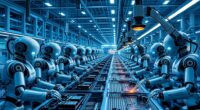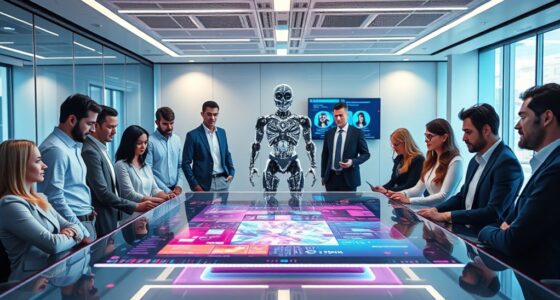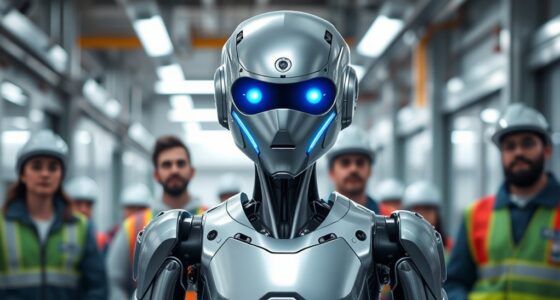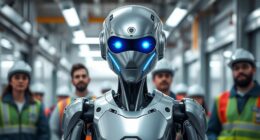AI is reshaping many jobs, especially those involving routine or repetitive tasks. Roles like customer service, data entry, manufacturing, and transportation face significant automation risks. However, many professions will evolve to focus on oversight, strategy, and high-value activities. While some tasks may become automated, new opportunities are emerging in fields that require problem-solving, creativity, and emotional intelligence. To discover how your career might be affected and what skills to develop, keep exploring this shifting landscape.
Key Takeaways
- Many routine and repetitive roles in manufacturing, data entry, and transportation are highly vulnerable to AI automation.
- AI is shifting jobs towards oversight, strategy, and high-value tasks, reducing the risk of complete job loss.
- Professions like legal, healthcare, and marketing benefit from AI efficiencies but require new skills for adaptation.
- Human oversight remains essential to ensure AI accuracy, fairness, and ethical decision-making across sectors.
- While some jobs may be displaced, AI also creates over 12 million new roles in tech, analysis, and oversight fields.
Financial Analysts and Accountants

AI is transforming the roles of financial analysts and accountants by automating routine tasks and providing more accurate, real-time data insights. You’ll find that AI handles data entry, financial reporting, and compliance management more efficiently, reducing errors and speeding up processes. This shift allows you to focus on strategic analysis and decision-making, rather than manual data crunching. AI-powered tools extract valuable insights quickly, identify trends, and forecast outcomes, helping you make better-informed decisions. Advanced analytics and predictive modeling improve your ability to detect fraud and assess risks. As a result, your role evolves from transactional work to offering high-value, data-driven advice. According to recent surveys, AI’s integration into the industry is expected to continue expanding, further transforming how professionals operate and deliver value. Additionally, understanding cybersecurity vulnerabilities associated with AI systems becomes crucial to protect sensitive financial data. Recognizing the importance of data security measures ensures the integrity of financial information in an automated environment. Developing a comprehensive understanding of AI and its potential risks can help you stay ahead of technological changes and maintain trust. Emphasizing ethical AI use can help mitigate biases and promote fairness in financial decision-making. This transformation enhances your expertise, enabling you to deliver more precise, timely solutions to clients or your organization.
Legal Professionals and Paralegals

Legal professionals and paralegals are increasingly harnessing AI to streamline their workflows and enhance accuracy. You’re likely using AI for tasks like drafting correspondence, conducting legal research, and reviewing contracts. AI tools help analyze firm data and automate document reviews, saving time and reducing errors. With 77% of lawyers using generative AI, productivity gains are evident, predicted to free up around 4 hours weekly per professional. These efficiencies lead to significant time savings—roughly 266 million hours annually in the U.S.—and translate into about $100,000 more billable time per lawyer each year. As workflows become more efficient, billable models shift from hourly to value-based or fixed fees. Your role increasingly focuses on strategy, client advising, and courtroom work, supported by AI’s analytical capabilities. AI’s integration is also prompting a reevaluation of traditional legal roles, emphasizing the need for technological skills and adaptability. Furthermore, understanding and managing AI security risks becomes essential as reliance on these technologies grows. Additionally, as AI adoption expands, the importance of ethical considerations in legal practice is becoming more prominent to ensure responsible use of technology. Recognizing the potential influence of prophetic dreams on decision-making, some legal professionals explore intuitive insights to complement AI-driven strategies. Staying updated on key traits of successful legal professionals such as attention to detail and analytical thinking can further enhance this evolving role.
Customer Service Representatives

As AI continues transforming professional fields like legal work, customer service is also experiencing a significant shift. You’ll see AI handling up to 95% of interactions by 2025, reducing resolution times by half and automating repetitive tasks. Customers prefer self-service options, with 81% choosing AI-driven solutions first, and about 80% report positive experiences. AI’s efficiency allows companies to cut staffing needs during busy seasons by up to 68%. The integration of customer support tools further enhances the capabilities of AI-driven systems. Additionally, advancements in exfoliation techniques like glycolic acid are improving skin care options for agents and customers alike.
Manufacturing and Assembly Line Workers
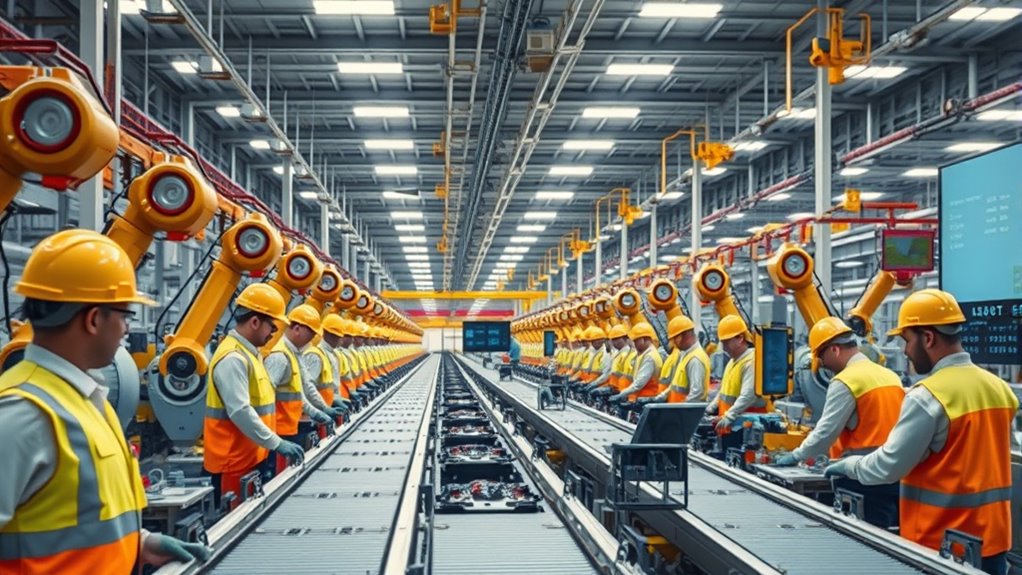
AI is transforming manufacturing by automating repetitive tasks like assembly and fastening, making processes more efficient. While some jobs may be replaced, many roles are evolving to include technical oversight and maintenance. Looking ahead, the industry will likely see a shift toward higher-skilled positions and new employment opportunities. Industry reports indicate a positive outlook on AI creating jobs and enhancing workforce capabilities. Additionally, advancements in Honda Tuning demonstrate how customization and technical expertise are evolving, reflecting broader changes in skilled labor roles. Understanding the Gold IRA landscape can also be crucial as industries adapt to economic shifts and technological innovations. Proper application timing of new tools and processes can further facilitate this transition. Moreover, awareness of AI vulnerabilities highlights the importance of ongoing AI security measures to protect both jobs and infrastructure. As the industry adapts, fostering skills in vibrational alignment and continuous learning will be essential for workforce resilience.
Automation of Repetitive Tasks
Automation of repetitive tasks in manufacturing and assembly lines is transforming how work is done. You’ll notice that nearly half of current activities could be automated with existing technology, mainly through robotics and RPA. These systems handle data entry, inventory, and assembly tasks without fatigue or distractions. They operate continuously, ensuring consistent precision and reducing human error. Repetitive, time-consuming tasks are now prime targets for automation, freeing workers to focus on oversight and problem-solving. You’ll see benefits like:
- Increased operational efficiency up to 30%
- Processing time reductions of 70–90%
- Minimized errors in assembly and quality control
- Consistent manufacturing precision
- Handling high volumes of tasks simultaneously
This shift allows manufacturers to cut costs, improve quality, and reallocate resources to higher-value activities.
Impact on Factory Jobs
While automation is increasing productivity and efficiency on the factory floor, it also brings significant changes to manufacturing and assembly line jobs. You might face displacement if your role involves repetitive tasks, but AI is also creating over 12 million new job opportunities, potentially outweighing losses. Companies are investing heavily, with sector growth expected to reach $8.57 billion by 2025, and AI is improving processes—reducing forecasting errors and downtime by up to 50%. Predictive maintenance can cut repair costs by 40%, while production increases of 10-15% are common. Many companies now use AI for quality control and supply chain management, boosting efficiency and early disruption detection. Overall, AI is transforming manufacturing, demanding that workers adapt to new roles and technologies for continued growth. Additionally, understanding juice extraction techniques and their benefits can help workers diversify their skill sets in related fields. Embracing technological advancements in manufacturing can also foster greater resilience and adaptability among workers. Furthermore, integrating mental health practices such as meditation can help employees manage stress and maintain focus amidst rapid technological changes.
Future Employment Prospects
As technology advances, manufacturing and assembly line jobs are evolving rapidly, opening new employment opportunities even as some roles become obsolete. AI investments are expected to reach $16.7 billion by 2026, creating over 12 million new jobs that outweigh potential job losses. You’ll see increased demand for tech-savvy roles focused on problem-solving and innovation. Upskilling will be essential, with a focus on advanced technical skills like programming, data analysis, and AI system management. The future offers:
- Growth in AI-related fields and innovation
- New roles such as AI ethicists and data scientists
- Increased importance of critical thinking and creativity
- Human-machine collaboration specialists
- Opportunities driven by AI-driven productivity and efficiency according to projections, 300 million jobs could be affected globally, highlighting the significance of workforce adaptation.
Marketing and Advertising Specialists

Have you wondered how AI is transforming marketing and advertising specialists’ roles? Today, AI is deeply integrated into your field, with 88% of marketers using it daily. It’s no longer optional—85.84% plan to boost AI use further, and nearly 20% allocate over 40% of their budget to AI-driven campaigns. You’re likely leveraging AI for content creation, personalization, and customer insights, with 25.6% finding AI-generated content more successful. While 69% of professionals are excited about AI’s potential, 60% fear it could replace their jobs. Despite these concerns, AI enhances efficiency, gives a competitive edge, and drives innovation. To stay relevant, you’ll need to adapt, as AI becomes a fundamental tool shaping the future of marketing and advertising.
Healthcare Diagnosticians and Assistants

AI is making a significant impact on healthcare diagnostics, transforming how medical professionals detect and treat diseases. It enhances accuracy and efficiency by quickly processing vast amounts of patient data, supporting diagnostic decisions, and reducing errors. As a result, your role as a healthcare diagnostician may evolve, with AI taking over routine, data-heavy tasks. AI’s benefits include:
AI is transforming healthcare diagnostics by improving accuracy, efficiency, and supporting clinicians in decision-making.
- Reducing errors by up to 86%
- Increasing disease detection rates, like a 20% boost in breast cancer cases
- Cutting workloads by as much as 44%
- Acting as a decision support tool for clinicians
- Improving patient outcomes through faster, more precise diagnoses
While AI streamlines processes, it also shifts your responsibilities toward oversight, interpretation, and patient interaction, ensuring humans remain central to healthcare delivery.
Education and Training Coordinators

How are AI tools transforming the role of Education and Training Coordinators? AI automates tasks like scheduling, record-keeping, and data analysis, freeing you to focus on curriculum design and relationship building. AI-powered platforms help create and deliver basic training content, while analytics identify skill gaps more efficiently. Personalized learning experiences are now possible through AI algorithms, enhancing traditional training methods. However, your human oversight remains essential for complex problem-solving, curriculum innovation, and fostering engagement.
| Task | AI Assistance | Human Role |
|---|---|---|
| Needs assessment | Data analysis and insights | Interpret results, plan actions |
| Content creation | Automated content generation | Customize and refine material |
| Training delivery | Adaptive learning platforms | Facilitate, motivate, and connect |
Software Developers and IT Support

Ever wondered how automation is reshaping software development and IT support roles? AI already generates code snippets, refactors code, and detects bugs, reducing manual tasks. By 2040, machines are expected to write most code, which could cut demand for traditional coding jobs. While nearly 30% of developers worry AI will replace their roles soon, automation boosts productivity, letting you focus on complex, creative work.
- AI handles routine coding and bug detection
- Developers shift toward design, UX, and coordination
- Skills in machine learning and data analysis grow in value
- New roles emerge in prompt design and ethics
- Industry-wide, AI accelerates workflows but doesn’t eliminate jobs
Automation is transforming your profession, making your skills more vital than ever.
Data Entry and Administrative Clerks

Data entry and administrative clerks are among the roles most vulnerable to automation because their tasks are highly repetitive and rule-based. Nearly half of their routine tasks can be handled by AI, reducing the need for human input. Automation not only streamlines workflows but also improves accuracy, cutting down errors in data handling. As AI adoption increases, many organizations are looking to cut costs, which often leads to layoffs in these roles. By 2025, up to 2 million workers in data entry and admin positions could face displacement. While productivity rises with AI, job security diminishes, and only a small percentage of companies actively reskill employees. Expect a significant decline in demand for these roles, with automation reshaping the labor market on a global scale.
Transportation and Delivery Drivers

Automation is reshaping many roles across the labor market, including transportation and delivery drivers. AI is improving efficiency and safety, but also changing job responsibilities. You might see better route planning with real-time traffic and weather data, reducing manual work. Predictive maintenance, powered by AI, can identify vehicle issues early, decreasing downtime. Autonomous vehicles are being tested for deliveries, potentially replacing some human drivers. AI also enhances fleet management through real-time tracking and predictive analytics, optimizing schedules and reducing costs. However, rather than complete replacement, your role could evolve to focus on oversight and decision-making that require human judgment. You may need to learn new skills, such as working with AI systems or understanding data insights. Ultimately, AI is transforming rather than eliminating many driver roles.
- Route optimization through real-time data
- Predictive vehicle maintenance
- Autonomous delivery vehicle development
- Enhanced fleet monitoring and analytics
- Shift toward oversight and decision-making
Frequently Asked Questions
How Soon Might My Profession Become Fully Automated?
You’re wondering how soon your profession might become fully automated. Currently, automation impacts sectors like energy, retail, and manufacturing, with managerial tasks increasingly at risk. While some jobs could see full automation by 2030 or later, others may only experience partial automation or role shifts. Stay adaptable by expanding your skills, especially in areas where AI complements human abilities, ensuring you remain valuable regardless of technological advances.
What Skills Can I Develop to Stay Relevant?
To stay relevant, you should focus on developing in-demand skills like AI and big data expertise, cybersecurity, and technological literacy. Cultivate creative and analytical thinking, and embrace continuous learning through upskilling and reskilling. Strengthen your leadership, strategic thinking, and virtual collaboration abilities. By staying curious and adaptable, you’ll be better prepared for future changes, ensuring your skills remain valuable regardless of technological advancements.
Will AI Create More Jobs in My Industry?
You might wonder if AI will create more jobs in your industry. The good news is, AI is expected to generate around 97 million new jobs by 2025, often in sectors related to technology, data analysis, and healthcare. These roles demand new skills, so you should focus on developing expertise in AI, cybersecurity, or data science. Embrace lifelong learning to stay ahead and leverage these emerging opportunities.
How Does AI Impact Job Security Long-Term?
Imagine a future where AI reshapes your job so radically, it feels like a rollercoaster with twists and turns you can’t control. Long-term, AI could threaten your job security by automating repetitive tasks and reducing entry-level opportunities. Yet, it also opens doors to new roles and skills. Staying adaptable and tech-savvy will be key, turning this wild ride into a chance for growth rather than fear.
Are There Regions Benefiting More From Ai-Driven Employment?
You’ll notice that some regions, like California, New York, and Massachusetts, benefit more from AI-driven employment growth. These areas host strong tech ecosystems and attract top talent, leading to higher salaries and more opportunities. Emerging hubs like North Carolina and Colorado are also gaining traction thanks to remote work trends. If you’re in or moving to these regions, you stand a better chance of tapping into AI job opportunities and staying ahead in the market.
Conclusion
So, as AI continues to evolve, it’s natural to wonder if your job’s on the line. While some roles face automation, others will thrive by adapting and leveraging new technologies. Remember, humans bring creativity, empathy, and critical thinking that AI can’t replicate. Are you ready to embrace change and upgrade your skills? Staying proactive might just be your best defense against the rise of AI in the workplace.

